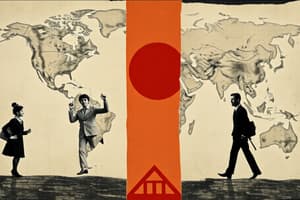Podcast
Questions and Answers
What is culture shock?
What is culture shock?
- Judging a culture based on your own
- A process by which cultures become similar
- An expression of disapproval for a norm
- Disorientation from encountering a different culture (correct)
What does cultural leveling refer to?
What does cultural leveling refer to?
- Not judging a culture
- Expressions of approval for upholding norms
- The process by which cultures differ
- Cultures becoming similar to one another (correct)
What is cultural relativism?
What is cultural relativism?
Not judging a culture but trying to understand it on its own terms
Define ethnocentrism.
Define ethnocentrism.
What are folkways?
What are folkways?
What are gestures?
What are gestures?
What does ideal culture refer to?
What does ideal culture refer to?
Define language.
Define language.
What are mores?
What are mores?
What is material culture?
What is material culture?
Define negative sanction.
Define negative sanction.
What is new technology?
What is new technology?
What is nonmaterial culture?
What is nonmaterial culture?
What are norms?
What are norms?
Define pluralistic society.
Define pluralistic society.
What is a positive sanction?
What is a positive sanction?
What is real culture?
What is real culture?
Define subculture.
Define subculture.
What is symbolic culture?
What is symbolic culture?
What is a symbol?
What is a symbol?
What does the Sapir-Whorf hypothesis suggest?
What does the Sapir-Whorf hypothesis suggest?
What are sanctions?
What are sanctions?
Define sociobiology.
Define sociobiology.
What is a taboo?
What is a taboo?
What is a value cluster?
What is a value cluster?
Define values.
Define values.
What is value contradiction?
What is value contradiction?
What is counterculture?
What is counterculture?
Flashcards
Culture Shock
Culture Shock
Disorientation from encountering a dramatically different culture.
Cultural Leveling
Cultural Leveling
Cultures becoming increasingly similar due to globalization.
Cultural Relativism
Cultural Relativism
Understanding a culture on its own terms, without judgment.
Ethnocentrism
Ethnocentrism
Signup and view all the flashcards
Folkways
Folkways
Signup and view all the flashcards
Mores
Mores
Signup and view all the flashcards
Gestures
Gestures
Signup and view all the flashcards
Norms
Norms
Signup and view all the flashcards
Ideal Culture
Ideal Culture
Signup and view all the flashcards
Real Culture
Real Culture
Signup and view all the flashcards
Material Culture
Material Culture
Signup and view all the flashcards
Nonmaterial Culture
Nonmaterial Culture
Signup and view all the flashcards
Symbolic Culture
Symbolic Culture
Signup and view all the flashcards
Symbols
Symbols
Signup and view all the flashcards
Sanctions
Sanctions
Signup and view all the flashcards
Negative Sanction
Negative Sanction
Signup and view all the flashcards
Positive Sanction
Positive Sanction
Signup and view all the flashcards
Pluralistic Society
Pluralistic Society
Signup and view all the flashcards
Value Cluster
Value Cluster
Signup and view all the flashcards
Value Contradiction
Value Contradiction
Signup and view all the flashcards
Counterculture
Counterculture
Signup and view all the flashcards
Taboo
Taboo
Signup and view all the flashcards
Sapir-Whorf Hypothesis
Sapir-Whorf Hypothesis
Signup and view all the flashcards
Sociobiology
Sociobiology
Signup and view all the flashcards
Study Notes
Culture Concepts in Sociology
-
Culture Shock: Disorientation experienced when encountering a fundamentally different culture, disrupting familiar assumptions about life.
-
Cultural Leveling: Process leading to increased similarity among cultures, driven by the global diffusion of Western culture.
-
Cultural Relativism: Approach of understanding a culture based on its own values and beliefs without imposing external judgments.
-
Ethnocentrism: Evaluating other cultures based on one's own cultural standards, often leading to negative assessments of different values and behaviors.
Norms and Communication
-
Folkways: Informal norms that dictate acceptable behavior but are not strictly enforced.
-
Mores: Strictly enforced norms crucial to a group's core values and well-being.
-
Gestures: Non-verbal communication methods where body movements convey meaning.
-
Norms: Social expectations regarding "right" behavior.
Cultural Components
-
Ideal Culture: Aspirational values and goals of a society, representing the standards that a group aims to uphold.
-
Real Culture: Actual behavior and norms followed by people, which may differ from ideal culture.
-
Material Culture: Physical objects representative of a culture, including art, architecture, and everyday items.
-
Nonmaterial Culture: Symbolic aspects such as beliefs, values, and behaviors of a group, including language and customs.
-
Symbolic Culture: Another term for nonmaterial culture, highlighting its representational aspects.
-
Symbols: Objects, gestures, or words that carry specific meanings and facilitate communication.
Social Sanctions and Societal Structure
-
Sanctions: Reactions—positive or negative—aimed at enforcing norms through rewards or punishments.
-
Negative Sanction: Disapproval expressed for norm violations, which can range from informal reactions to severe consequences.
-
Positive Sanction: Praise or reward granted for adherence to social norms.
-
Pluralistic Society: A society characterized by diverse groups with varying cultural backgrounds and practices.
Cultural Conflicts and Theories
-
Value Cluster: Groups of interrelated values that collectively form a broader cultural perspective.
-
Value Contradiction: Existence of conflicting values within a culture, where adherence to one may oppose another.
-
Counterculture: A cultural group that actively opposes and rejects the dominant societal values and norms.
-
Taboo: An extremely strong norm that elicits outrage and severe sanctions if violated.
-
Sapir-Whorf Hypothesis: Theory positing that language shapes thought processes and perception of reality.
-
Sociobiology: Framework suggesting human behavior is influenced by biological and evolutionary factors, linking social behavior to natural selection.
Studying That Suits You
Use AI to generate personalized quizzes and flashcards to suit your learning preferences.




